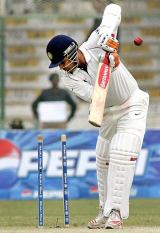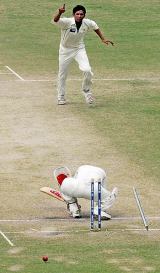
|

Virender Sehwag was cleaned up by Mohammad Asif as he stayed adhesively at the crease and was beaten by the one that nipped back in
© AFP
|
|
It took till the last day of the series for the expected battle to unravel. All pre-series talk had hovered around seaming, bouncy tracks and, inevitably, a battle between Pakistan's bowlers and India's batsmen. India's first innings at Karachi gave us a few early pointers but the ultimate test came today, with India's batsmen yet again pushed to a corner and, for the first time in this series, on a lively deck. It was all set-up for the most natural conclusion to the series, a smaller tussle that would decide the bigger picture.
Could India's batsmen thwart a varied bowling attack on a pitch, unlike at Lahore and Faisalabad, offering some assistance? Could they, for the third time in the series, stand up against pace, swing, seam and spin? Would a stunning counterattacking partnership save them again? Could a much-hyped batting line-up engineer a heroic resistance? As expected, the answers to all turned out to be no. What was hard to fathom, though, was what an
emphatic no it turned out to be. For a line-up to last just 58.4 overs on a pitch where one man made a most authoritative century, and to crash to their second biggest defeat, told you a bit about the approach the rest adopted.
Taking an upbeat approach was probably the only way but surely there must be a fine line between being positive and being positively exposed. It has often required just a bit of juice on the surface, in either form of the game, to rattle the Indian batting line-up (Jamshedpur last year when Rana Naved-ul-Hasan did the trick, Hyderabad a few months back when Pollock and
Co. had India running) and the fact that they hadn't encountered such conditions in a Test for a while couldn't hide the fact that they were still vulnerable. One isn't suggesting that they should have batted out 167 overs in the final innings - the best any Indian side had managed was
150.5 at The Oval in 1979 - but a hunger to fight for as long as possible, to stretch the game onto the fifth day, to temper their aggression, not trying one stroke too many, was probably a fair demand.

|

Sachin Tendulkar was bowled by Asif, beaten by a ball that kept a touch low
© AFP
|
|
A few deliveries that Mohammad Asif was conjuring up may have beaten the best of techniques but whether the top order needed to come out with such a blaze, attempting to score off almost every ball, driving expansively when they knew prodigious cut awaited them, is a question to be asked. The only batsman who can blame his luck is probably Sachin Tendulkar, beaten
by the lack of bounce, but the rest will need to delve on the reasons for the two collapses, managing just a little more than 50 overs in both innings.
What the miserable cave-in meant was that Yuvraj Singh's awesome century, which Dravid justifiably called a "beauty", may be lost in the rubble. Make no mistake, it was a diamond amid the wreckage with boundaries lashed with some thunderous fury. Showing that his 66.7 second-innings average was no eyewash, demonstrating the qualities to handle extreme pace,
and most vitally, displaying the nous to judge the movement, he laid into one of the most assured acts of violence all series. Watching Yuvraj pulverise the bowling, with every shot being spanked with confidence, was an indication of how things got easier after the new-ball storm. By then,
though, India had walked straight into the trap; Yuvraj's cracker would only delay the inevitable.
Maybe one can blame the bowlers, or maybe even question the logic of using three left-arm seamers, but one mustn't forget that it was the same attack that had bowled a side out for less than 250 on the first day.
At Rawalpindi two years back, when India bowled them out for 224, it was the batsmen who cashed in and piled on a big score, leading the way for a series win. The end here, though, was the other end of the spectrum as the castle that they had so carefully, and admirably, guarded throughout the series was blown away in a span of 20 manic overs.
Siddhartha Vaidyanathan is staff writer of Cricinfo



